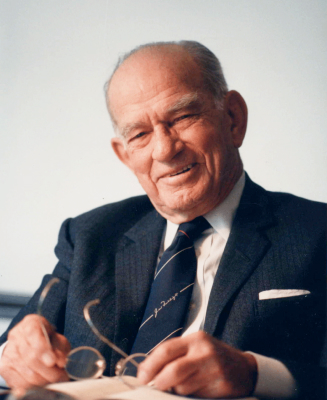Fulbright Programs
Fulbright Program Overview

“Educational exchange can turn nations into people, contributing as no other form of communication can to the humanizing of international relations. ... I do not think educational exchange is certain to produce affection between peoples, nor indeed do I think that is one of its necessary purposes; it is quite enough if it contributes to the feeling of a common humanity, to an emotional awareness that other countries are populated not by doctrines that we fear but by people with the same capacity for pleasure and pain, for cruelty and kindness, as the people we were brought up with in our own countries.”
Senator J. William Fulbright
Objective
The Fulbright grant has an international reputation built on the principles of binational governance, autonomy, and open competition based on individual merit without regard to the individual's institutional affiliation, geographical location, race, color or creed. The objective of the grant is not only to enable the recipient to pursue a particular field of study but to develop leaders who can contribute to promoting mutual understanding between the United States and Japan.
History
The United States Congress created the Fulbright Program in 1946, in the aftermath of World War II, to promote mutual understanding between the United States and the rest of the world, an objective that is as relevant today as it was then. This program's foremost advocate, the late Senator J. William Fulbright, presented the bill to establish an educational exchange program only weeks after the dropping of the atomic bomb in Hiroshima and Nagasaki.
Over the years, the Fulbright Program has developed into the world's largest, best-known and most prestigious educational exchange program built on the principles of binational governance, autonomy, and open competition based on individual merit without regard to the individual's institutional affiliation, geographical location, race, color or creed. Every year, the Fulbright Program provides over 400,000 scholars and students with the opportunity to study abroad.
Today, there are over 160 countries, including Japan, participating in the Fulbright Program, which has played an important role in fostering the development of leaders in various fields. With the new challenges faced by today's world, the need for the Fulbright Program is stronger than ever.
Funding and achievements
The Fulbright Program in Japan is primarily funded by the U.S. and Japanese governments and is also supported by private companies, organizations, and individuals.
To make private fundraising activities more efficient and long-lasting, Japanese Fulbright alumni established the Japan-United States Educational Exchange Promotion Foundation .*
*The Japan-United States Educational Exchange Promotion Foundation, a public interest incorporated organization officially recognized by the Government of Japan, provides financial support to Japanese and American grantees studying under the Fulbright Program. Among the programs where the Foundation is involved in is the Fulbright-Mikitani Memorial Grant. The Fulbright-Mikitani Memorial Grant recipients are chosen from among Graduate Study grantees who are interested in this grant and through a review process conducted by Japan-U.S. Educational Commission, Mr. Hiroshi "Mickey" Mikitani, and Japan-United States Educational Exchange Promotion Foundation.
Approximately 30 to 40 grants are awarded annually to Americans and Japanese each to participate in the Fulbright Program.
Alumni of both the GARIOA (Government and Relief In Occupied Areas) and Fulbright Program (known as Fulbrighters) play leading roles in various fields, holding senior positions on the Supreme Court, in the Diet, in Japan's diplomatic corps, in higher education, in the media and at major corporations.
COMMENCEMENT IN JAPAN 1952
TOTAL PARTICIPANTS SINCE 1952 over 9,700
Japanese: over 6,700 Americans: over 3,000
Participants for the Past 10 years
| Year | Japanese | American |
|---|---|---|
| 2024 | 32 | 42 |
| 2023 | 32 | 42 |
| 2022 | 39 | 38 |
| 2021 | 30 | 27 |
| 2020 | 25 | 33 |
| 2019 | 42 | 52 |
| 2018 | 49 | 53 |
| 2017 | 38 | 42 |
| 2016 | 42 | 48 |
| 2015 | 42 | 42 |
Contributions and Donations
In addition to the primary funding from both the Japanese and U.S. governments, the Fulbright Program in Japan gratefully receives support from the private sector companies, organizations, and individuals.
Japan-United States Educational Exchange Promotion Foundation
2024
- All Nippon Airways, Co., Ltd. (In-kind contribution)
- Delta Air Lines, Inc. (In-kind contribution)
- Fulbright-Glen S. Fukushima Fund
- Fulbright-Mikitani Memorial Grant *
- Fulbright-Miwa Grant
* Following the selection of the Graduate Study Program's grantees, the Fulbright-Mikitani Memorial Grant recipients are chosen from among those who are interested in this grant and through a review process conducted by Japan-U.S. Educational Commission, Mr. Hiroshi "Mickey" Mikitani, and Japan-United States Educational Exchange Promotion Foundation.
Quick overview of the Fulbright Program
The Fulbright Program is a scholarship program that has an international reputation built on the principles of binational governance, autonomy, and open competition based on individual merit without regard to the individual's institutional affiliation, geographical location, race, color or creed.
Establishment |
August 1, 1946 |
|---|---|
Participating countries |
Over 160 countries |
Program size since 1946 |
Approx. 400,000 |
Annual number of award |
8,000 grants |
Funding Sources |
U.S. Department of State (Bureau of Educational and Cultural Affairs), |
